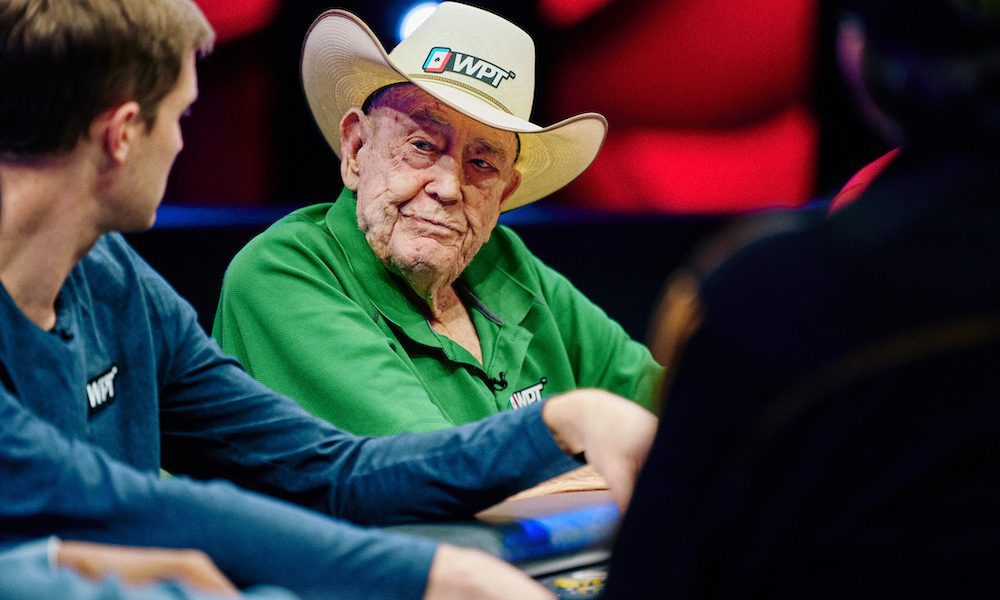Doyle Brunson was an easy man to underestimate.
Those who knew him only as the big, affable, poker king in the white cowboy hat, “Texas Dolly” by moniker, saw only the slimmest slice of the man. I suspect that easygoing country manner proved very good for his bankroll over the years.
Brunson’s recent death at age 89 has generated much-deserved and generous remembrances. He was, after all, one of the founders of modern professional poker. He helped make Binion’s World Series of Poker a household name suitable for television audiences that liked to look down on gamblers.
To a generation of players, Brunson was the “Godfather of Poker.” He’d won enough champion’s bracelets to open his own jewelry store.
But just imagine for a moment if those heart-felt obituaries were about the life of a former NBA basketball star, a tough kid from Longworth, Texas, with ice water in his veins who could shoot long-range jumpers from beyond a 3-point line not yet created at a time most players’ canvas high-tops remained flat on the floor.
In an era of set shots, Doyle Brunson had real game. As a college junior, he led Hardin-Simmons of Abilene, Texas, to the NCAA tournament. He also starred on the university’s track team.
After being named conference MVP his junior year, he attracted attention from the professional ranks.
“The Minneapolis Lakers sent an NBA scout to talk with me,” he recalled in his entertaining autobiography, The Godfather of Poker. “The pros couldn’t talk to underclassmen, so they talked to my coach. The Lakers’ scout told my coach I’d be their number-one draft choice the following year. He said they’d been watching me and needed a guy like me to be their shooting guard.
“After my junior year, my future appeared about as golden as it gets.”
But an accident over the summer at a gypsum plant changed Brunson’s future for good. His right leg was crushed by a stack of sheetrock. Doctors saved the leg and with multiple surgeries it healed well enough to put him back on his feet. Although things might have turned out differently if he’d seen an orthopedic specialist, Brunson’s days as a budding hardcourt king were over.
“Maybe it was a blessing in disguise. But at the time, I sure as hell didn’t see it that way,” he said.
As anyone who ever watched him play poker or shoot a round of golf would attest, his competitive fire didn’t dampen a bit. He focused it on poker, but also school, earning a Master’s degree in administrative education and business administration.
“I emerged from a poor background and wanted something better,” he wrote. “At some point, I was aware that successful gamblers had what I considered a lot of money. I wanted to be one of them. But to be safe, I had to rely on what a good education might give me. At least I thought I did. … I still wanted to live a better life than the one I’d known on the farm. Ambition compelled me to stay in school. A Master’s degree suggested certain values and character and it reflected on the kind of person you were or wanted to be.”
All that came his way when a life spent with his family and surrounded by close friends included those 10 bracelets he won at the World Series of Poker, after he thought he’d lost just about everything worth living for.
His life was riddled with adventure and no shortage of danger. He was, after all, a razor-sharp professional poker player known for his big bankrolls. He was also resilient and clearly up for the ride.
At the outset of his autobiography, he writes, “Life is not a journey to the grave with the intention of arriving safely in a pretty and well-preserved body, but rather to skid in broadside, thoroughly used up, totally worn out, and loudly proclaiming: Wow, what a ride!”
Doyle Brunson never played for the Lakers and as time went on had great difficulty even walking. But no matter the distance, he almost always found a path to the final table.



